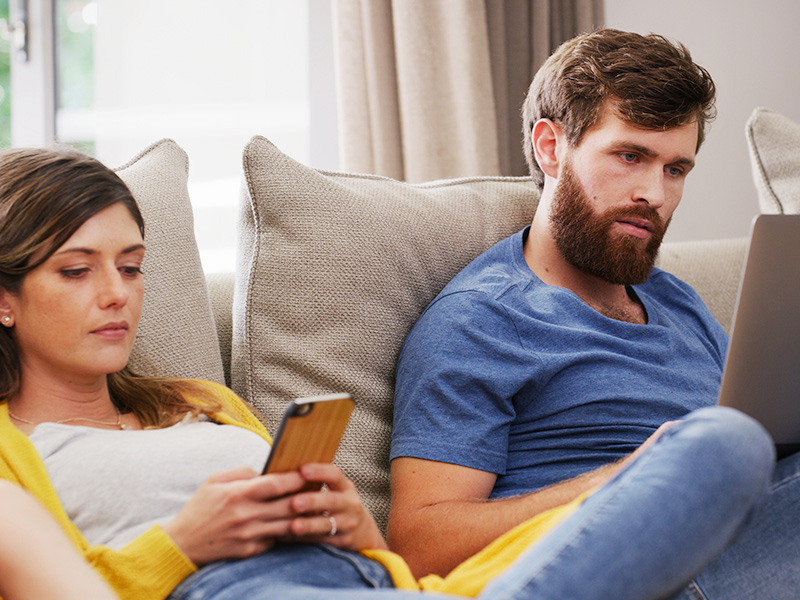5 signs you need a break from social media (and how to do it)
There’s no denying social media is a huge part of our lives, but experts say constant scrolling could affect our wellbeing. Here are the red flags to watch for.
According to statistics, eight out of 10 Australians are active on social media, spending an average of nearly two hours a day scrolling through different social platforms.
At the same time, research out of the UK reveals taking the occasional social media break might be wise.
“We know that social media usage is huge and that there are increasing concerns about its mental health effects, so with this study, we wanted to see whether simply asking people to take a week’s break could yield mental health benefits,” study lead author Dr Jeff Lambert said at the time of publication.
“Many of our participants reported positive effects from being off social media, with improved mood and less anxiety overall.
“This suggests that even a small social media break can have an impact.”
According to Deakin University’s School of Psychology senior lecturer Dr Sharon Horwood, the first step is to use social media mindfully.
“Make the effort to be consciously aware of what you’re doing and seeing – and how you’re responding,” Dr Horwood says.
5 signs it’s time to take a social media break
- Social media is devouring your time
While research shows that the number of hours spent on social media doesn’t always correlate with problems or even addiction, it can still be important.
“If your gut feeling is that you’re spending too much time scrolling, or you’ve missed an obligation because of it, or a loved one’s annoyed by your social media usage, that’s a red flag,” Dr Horwood says.
- Scrolling makes you feel bad
“If you notice social media is making you fearful, worried, uneasy or anxious, that’s a sign to change the way you’re engaging with it,” she says.
- You’re always comparing yourself to others
“What we call upward social comparisons in psychology – where you feel like you’re not successful enough or attractive enough or happy enough compared to the accounts you’re following – can make us feel like we’re inadequate in some way,” Dr Horwood explains.
- You’re using social media in “unhealthy contexts”
According to Dr Horwood, a good example of a “context” problem is when you’re getting to sleep later than you plan to because you’re scrolling through social media in bed.
- You feel anxious if you can’t check in
Called fear of missing out, you feel apprehensive if you can’t see online content or respond to interactions with others quickly enough.
- Beat it: 7 strategies to reduce anxiety
How to take a social media break
Think going cold turkey is the best approach? Think again.
Dr Horwood points out this is not only unrealistic for people who rely on social media for business, it can also have a negative impact on others.
“Shutting down social media completely for a while could be good as a circuit breaker for some people but if it makes you feel even more anxious, it’s probably not right for you,” Dr Horwood says.
Even though participants in the UK study took a week-long break, Dr Lambert agreed that a softer approach may be better.
“Social media is part of life and for many people, it’s an indispensable part of who they are and how they interact with others,” Dr Lambert said.
“But if you are spending hours each week scrolling and you feel it is negatively impacting you, it could be worth cutting down on your usage to see if it helps.”
Effective strategies for a mini-break
Close some accounts
“If you’re using several social media platforms, consider how many of them you actually enjoy rather than simply checking just because they’re there,” Dr Horwood suggests.
“Then make the decision to reduce the number of platforms you’re active on.”
Turn off app notifications
Dr Horwood says this puts a stop to those interruptions that draw your attention back to your accounts.
“When you’re not getting those constant prompts and reminders, eventually you’ll get used to not checking your accounts as often,” she adds.
Set aside some designated social media time
“It might be 20 minutes, it might be an hour – this strategy allows you to contain your social media use so that you’re in control of it, as opposed to it interrupting you all day, or finding yourself mindlessly scrolling when you should be doing other things, like sleeping,” Dr Horwood explains.
Curate your feed
“Ultimately, you have control over what goes through your feed so if you notice content that’s having a negative impact, get rid of it by unfollowing those accounts,” she suggests.
- Take heed: Dangerous TikTok dental trends to avoid
Written by Karen Fittall.





